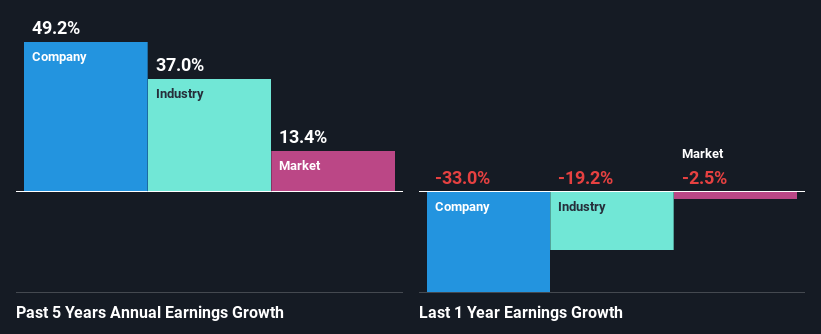Is Marathon Petroleum Corporation's (NYSE:MPC) Latest Stock Performance A Reflection Of Its Financial Health?
Most readers would already be aware that Marathon Petroleum's (NYSE:MPC) stock increased significantly by 28% over the past three months. Given that the market rewards strong financials in the long-term, we wonder if that is the case in this instance. Particularly, we will be paying attention to Marathon Petroleum's ROE today.
Return on equity or ROE is a key measure used to assess how efficiently a company's management is utilizing the company's capital. In other words, it is a profitability ratio which measures the rate of return on the capital provided by the company's shareholders.
Check out our latest analysis for Marathon Petroleum
How To Calculate Return On Equity?
The formula for return on equity is:
Return on Equity = Net Profit (from continuing operations) ÷ Shareholders' Equity
So, based on the above formula, the ROE for Marathon Petroleum is:
36% = US$11b ÷ US$31b (Based on the trailing twelve months to December 2023).
The 'return' is the profit over the last twelve months. So, this means that for every $1 of its shareholder's investments, the company generates a profit of $0.36.
What Has ROE Got To Do With Earnings Growth?
Thus far, we have learned that ROE measures how efficiently a company is generating its profits. Depending on how much of these profits the company reinvests or "retains", and how effectively it does so, we are then able to assess a company’s earnings growth potential. Assuming all else is equal, companies that have both a higher return on equity and higher profit retention are usually the ones that have a higher growth rate when compared to companies that don't have the same features.
A Side By Side comparison of Marathon Petroleum's Earnings Growth And 36% ROE
First thing first, we like that Marathon Petroleum has an impressive ROE. Second, a comparison with the average ROE reported by the industry of 21% also doesn't go unnoticed by us. So, the substantial 49% net income growth seen by Marathon Petroleum over the past five years isn't overly surprising.
We then compared Marathon Petroleum's net income growth with the industry and we're pleased to see that the company's growth figure is higher when compared with the industry which has a growth rate of 37% in the same 5-year period.
Earnings growth is a huge factor in stock valuation. It’s important for an investor to know whether the market has priced in the company's expected earnings growth (or decline). This then helps them determine if the stock is placed for a bright or bleak future. Is MPC fairly valued? This infographic on the company's intrinsic value has everything you need to know.
Is Marathon Petroleum Making Efficient Use Of Its Profits?
Marathon Petroleum's three-year median payout ratio to shareholders is 11%, which is quite low. This implies that the company is retaining 89% of its profits. This suggests that the management is reinvesting most of the profits to grow the business as evidenced by the growth seen by the company.
Moreover, Marathon Petroleum is determined to keep sharing its profits with shareholders which we infer from its long history of paying a dividend for at least ten years. Upon studying the latest analysts' consensus data, we found that the company's future payout ratio is expected to rise to 26% over the next three years. Therefore, the expected rise in the payout ratio explains why the company's ROE is expected to decline to 22% over the same period.
Conclusion
In total, we are pretty happy with Marathon Petroleum's performance. Specifically, we like that the company is reinvesting a huge chunk of its profits at a high rate of return. This of course has caused the company to see substantial growth in its earnings. Having said that, on studying current analyst estimates, we were concerned to see that while the company has grown its earnings in the past, analysts expect its earnings to shrink in the future. Are these analysts expectations based on the broad expectations for the industry, or on the company's fundamentals? Click here to be taken to our analyst's forecasts page for the company.
Have feedback on this article? Concerned about the content? Get in touch with us directly. Alternatively, email editorial-team (at) simplywallst.com.
This article by Simply Wall St is general in nature. We provide commentary based on historical data and analyst forecasts only using an unbiased methodology and our articles are not intended to be financial advice. It does not constitute a recommendation to buy or sell any stock, and does not take account of your objectives, or your financial situation. We aim to bring you long-term focused analysis driven by fundamental data. Note that our analysis may not factor in the latest price-sensitive company announcements or qualitative material. Simply Wall St has no position in any stocks mentioned.

 Yahoo Finance
Yahoo Finance 
